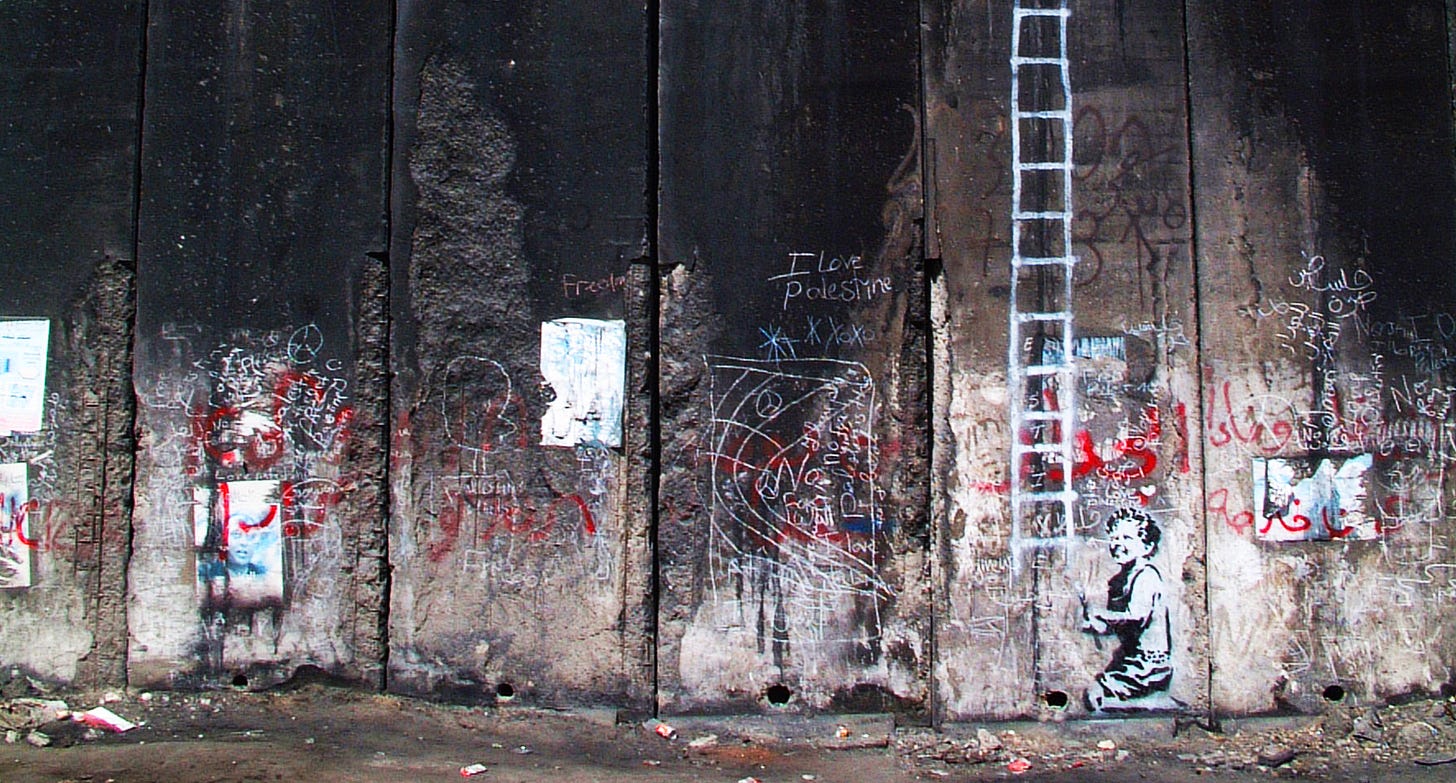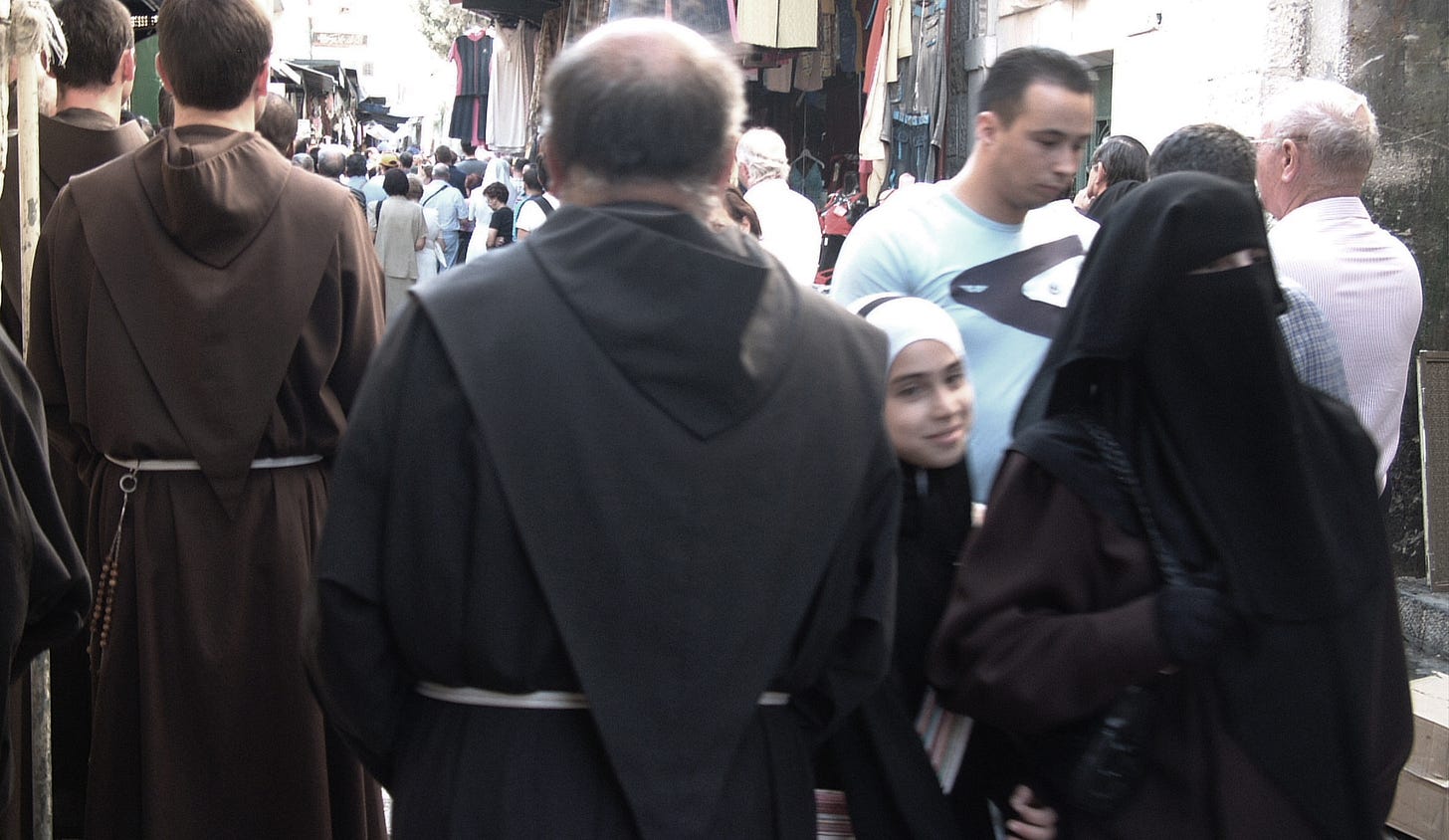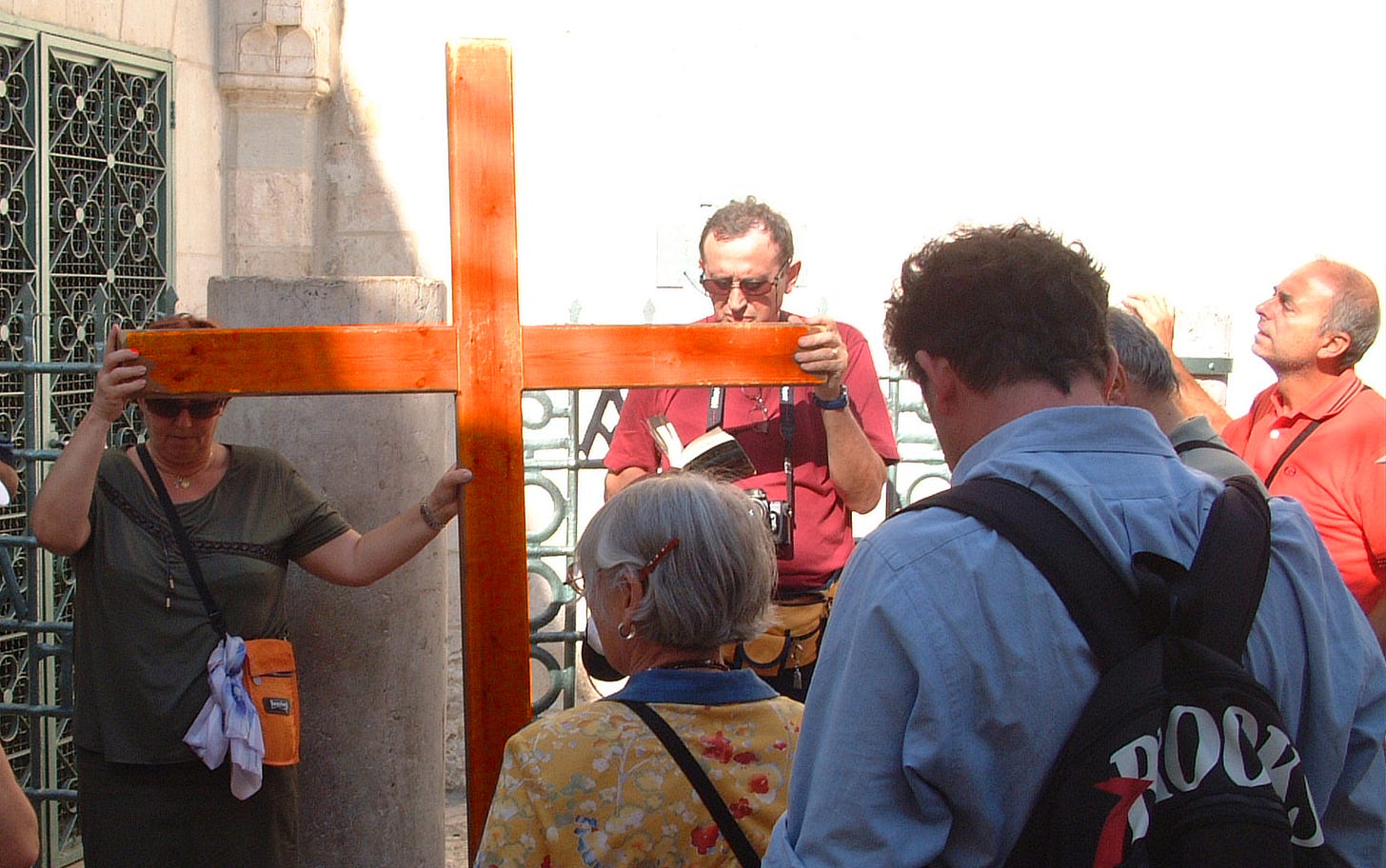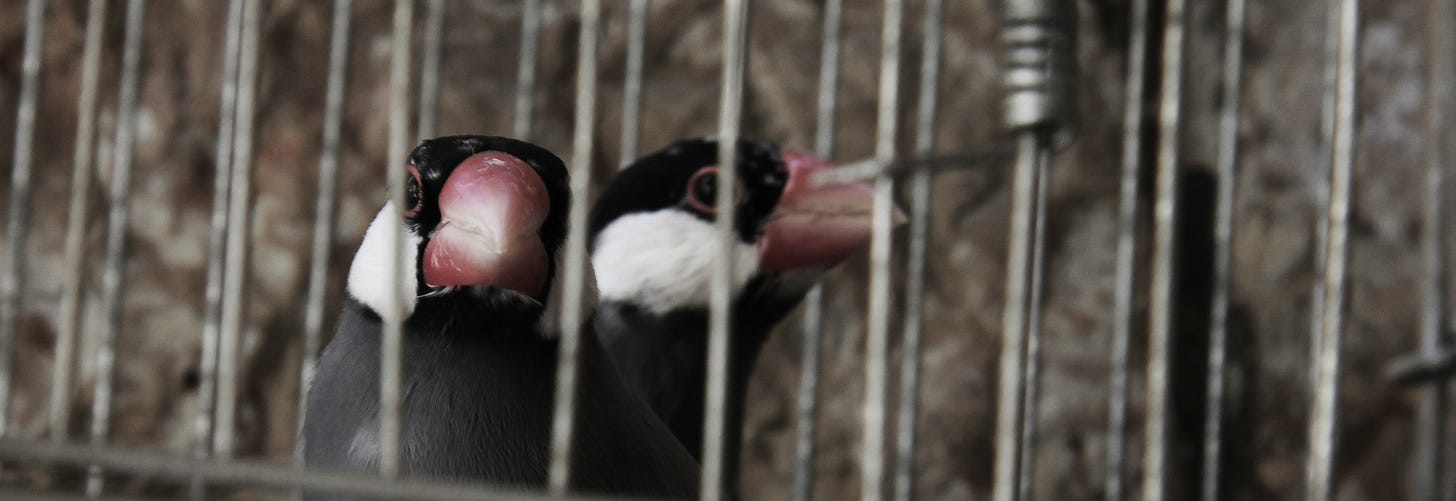November 1979: The film Monty Python's Life of Brian is released in the UK. I go to see it at the ABC Haymarket cinema in Newcastle. Built in 1933 to hold 1,280 people, the theatre's decor was intended to be an orientalist fantasy with camel and palm tree friezes which happened to be the perfect venue for a movie purportedly set in the Holy Land. The sell-out audience is almost entirely made up of students like myself. Each scene skewers human self-deception, irrationality and ignorance with relentless glee. At the time it seems that we are laughing at the past, the ridiculous world of our parents and grandparents. Unfortunately it later turns out that we are laughing at our own future.
2006. I travel to Israel and Palestine. Jerusalem feels like a city where a storm is about to break.
My visit starts badly. Landing at Tel Aviv airport, I realise that I have brought the wrong passport, the one with visa stamps for Iran, Pakistan, Afghanistan and Yemen, rather than the one with lots of blank pages. I am removed from the passport control area and taken to a back room for interrogation. Mostly this consists of repeated ten-minute grillings as to why I have visited these dangerous places, then an hour alone, followed by a new officer asking the same questions. And again, and again. They are waiting for me to alter my story or slip up. I am being evasive, of course. I don't want them to know that I am on a journalistic assignment. I tell them I am an academic and have a meeting lined up with a professor at Tel Aviv University. This has the advantage of being true.
After five hours they release me. I assume the academic has vouched for me (he has not) and catch the bus into Tel Aviv. Next day I meet Professor Israel Finkelstein, co-author of The Bible Unearthed. He is an engaging and likeable archaeologist, who contends that his subject should be rigorously scientific. His book is an attempt to separate Biblical legend from archaeological evidence.
I take the bus to Jerusalem and stay in the classic American Colony Hotel, home to generations of journalists. Walking the alleyways of the old city, I bump into all kinds of strange people. An old Hasidic Jew leans towards me conspiratorially, "British?"
I nod.
"Your Queen Elizabeth - very beautiful girl."
There's a group of men dragging heavy wooden crosses along the route that Jesus is supposed to have followed, the via dolorosa. Sweating and heaving, they are being photographed by their wives. I feel that I have landed in a Life of Brian remake. I can't help but remember Michael Palin as the obsequious prisoner, Ben, who is trying to curry favour with his gaolers. "Nail him up, I say. Nail some sense into him!"
In one shop window I see an interesting wooden model of a building and go inside to find an obese young man from Birmingham. He is here to gather funds for a project to rebuild the Jewish temple. This will involve demolishing one of the holiest shrines in Islam, the Dome of the Rock, a prospect he waves aside like an annoying fly. "They've had it for 2,000 years, now it's our turn." His West Midlands accent is strong. He has been in Israel two months. His grandparents’ generation had suffered in the Holocaust and now he harbours all the grievances and simmering hatred that they, inexplicably, had not had. “They were just happy to survive.” This too seems to make him angry.
Outside a black American Christian dressed in rags is crawling up the alleyway, eyes ablaze with spiritual fervour, knees bleeding.
"We call that Jerusalem Syndrome," says the Brummie builder confidently, like an old hand. "I can't tell you how many prophets I've had in here."
I stare into his face, searching for the trace of a smile, but there isn't one. "This is all ours," he says. "This city is ours. All of it. The Bible says so."
Outside groups of people are chanting, shouting, and demonstrating. I am thinking, 'This is a madhouse', when a tall, long-haired youth in robes steps inside the shop and announces, "I am Jesus."
The Brummie chases him out, grumbling. After only two months, he’s already fed up with messiahs.
Near the Western Wall there is the place where, in 1625, a tunnel entrance was discovered, later explored by the American Biblical scholar Edward Robinson in 1838. Now that spot is scene of a massive archaeological project. Israeli soldiers and police are everywhere, heavily armed. Groups of Israeli teenagers singing the national anthem are being sent down what they call Hezekiah's tunnel. I follow them. The tunnel is shoulder-wide, knee-deep in water and barely five feet high. Gun barrels scrape the walls. Behind me is another American Christian. "I came to see where our saviour walked." When we emerge, it is next to an Arab shop but I'm the only person who goes in. The owner, Ibrahim, is not doing good business. "Since all this started, nobody comes. The Israelis won't and the Arabs daren't."
The tunnel is clearly ancient, but claims that it was built by the 13th king of Judah, Hezekiah, in the 8th century BC, are unproven.
At the Imperial Hotel near the Hebron Gate I interview Archbishop Attalah Hanna. He is wearing the black robes and hat of a Greek Orthodox priest. Born in a Palestinian village to Eastern Orthodox parents, he is a forceful and fluent speaker who represents all that is complex and fascinating about this place. "Justice and rights are stronger than bombs," he tells me, "Military solutions always fail."
He is seething with fury because earlier in the day he had gone to Ramallah, the de facto Palestinian capital, for a conference about Palestinian prisoners in Israeli jails. At the checkpoint Israeli soldiers turned him back. Behind all this is a crisis. The Greek Orthodox Patriarch of Jerusalem has sold church property in Arab East Jerusalem to Israelis, an act that led to his overthrow and the installation of a new patriarch, one the Israelis refuse to recognise unless he sells them more property.
In East Jerusalem a shopkeeper takes me up on a roof and shows me how Israeli settlers are building fortified gantries, effectively erecting a separate community within the city. As we watch the sun set, some young settlers wired up with walkie-talkies appear. I’m struck by their confident demeanor and their military boots, striding around like experienced roadies at a rock concert, ignoring the audience, meticulously preparing for the main event yet to come.
Through a contact I meet Reuben outside Blockbuster Video in West Jerusalem. A serious young man, he drives me past the Knesset and various politicians' houses, including the new leader of the Opposition, a man called Benjamin Netanyahu. There are no lights on.
We enter a parallel world, one that exists inside the Holy Land, but is entirely separate from the crowded, noisy world of Palestinians, Greek orthodox priests, and Jesus-lookalikes dragging crosses. Here the roads are well-maintained and gardens beautifully planted. It could be an upmarket part of California or the Mediterranean, a gated community that is also a nation state.
I sit in a bar, drinking beer with Reuben and his friends. The buildings around the square look ancient. "It was an Arab village," says Reuben, "But they all ran away in '48." The young people are lively, getting drunk.
"So the former inhabitants?" I ask, "Where are they? What happened to them?"
He shrugs, uninterested. "Israel is everything to us. It's our shelter - the place Jews can run to."
Reuben's grandfather survived Auschwitz and went home to Romania. The rest of his family had died in the camp and he never spoke about it, or being Jewish. "He lived like a Christian, even kept pigs."
Then in 1955 he heard that his brother had in fact survived and was living in Israel. He packed up and left for Tel Aviv.
Reuben drives me out to his home town, Maale Adumin. It's a settler community, outside of the 1967 borders. We eat cheeseburgers. I want to say, Blessed are the Cheeseburgers, but Reuben doesn't seem like the kind of guy who laughs a lot, or would enjoy the kind of film references that amuse me.
"The Holocaust was not the first time," Reuben says in the car heading back to Jerusalem. "And maybe not the last."
He drops me where we started, outside Blockbuster Video. I walk back to the American Colony Hotel, feeling like I am waking from a weird dream.
Near the Western Wall there is one Palestinian house left in what has become a Jewish quarter. It belongs to Ismail al-Eid. He's living in a paint-peeling room with an arched ceiling. The television is inside a wooden case and on top, china knick-knacks, family photos and artificial flowers. His son brings grapes, cigarettes and crisps, then coffee.
"My grandfather and father were born in this house," Ismael tells me. "And me too. But now I'm being forced out. I'll be a refugee in my own city." He looks tired. On the table is the book he's consulting, 'A Dictionary of Diplomacy and International Relations.' "They came here and told me I was living in a stolen house," he says miserably. "They had forged documents to prove it."
Could he simply sell up and move?
"There are people who will kill me if I do." He thinks a bit. "And there are people who will kill me if I don't."
He shows me out to the rear of the house where there is a lovely courtyard with lemon and pomegranate trees hung with several birds in cages: finches and budgerigars.
Ismail's earliest memory is of violence. "It was 1951 and I was five years old. My father managed the vegetable market in David Street. All the peasants were coming to sell their apples and grapes during the summertime when suddenly we heard gunfire. Bullets were cracking overhead. A peasant lady grabbed me and pulled me behind some doors. I can still remember peeping out through a crack into the street. Everyone was running. Soldiers were beating people and shooting. Someone had assassinated King Abdullah of Jordan in the al-Aqsa Mosque."
The murder was a key moment in the unfolding catastrophe that would roll forward, apparently without end, driven by the forces of self-deception, irrationality and ignorance.
Ismail looks at the birds. "This yellow one sings beautifully in the morning. My son likes to keep them, but I prefer to release them." And with that he opens the cage door for two of the finches.
But the birds seem confused and do not move. Ismail shrugs and closes the door, adding, "'amal khair wa 'irmia fil-bahr."
Which literally translates as 'Do good, then throw it in the sea,' meaning, I suppose: 'Do good and expect nothing in return.'
"There are nice people here," he says, "It's the boys who throw things and shout abuse that I don't like."
At the door, as we say goodbye, he puts a hand on my arm. "When the people here live together in peace like brothers, it will be wonderful." The door closes and I hear him lock it.
The ABC Haymarket cinema in Newcastle was demolished in 1985. It is now a car park. Monty Python’s Life of Brian is best seen in the company of over a thousand giggling students, but failing that, it’s on Netflix.








What a terribly profound backstory. Patient and thoughtful.
Thank you for relaying your visit to Jerusalem, and for your remembrances of the Palestinian, Jewish, and Christian experience in the region.
I found it particularly moving to read:
"When the people here live together in peace like brothers, it will be wonderful."
Perhaps if Ismail's sentiment was shared more broadly across the globe, we might conjure a peace unlike anything seen before.
There is an undeniable hope where there is kinship.
Thank you again for sharing,
till next time,
L